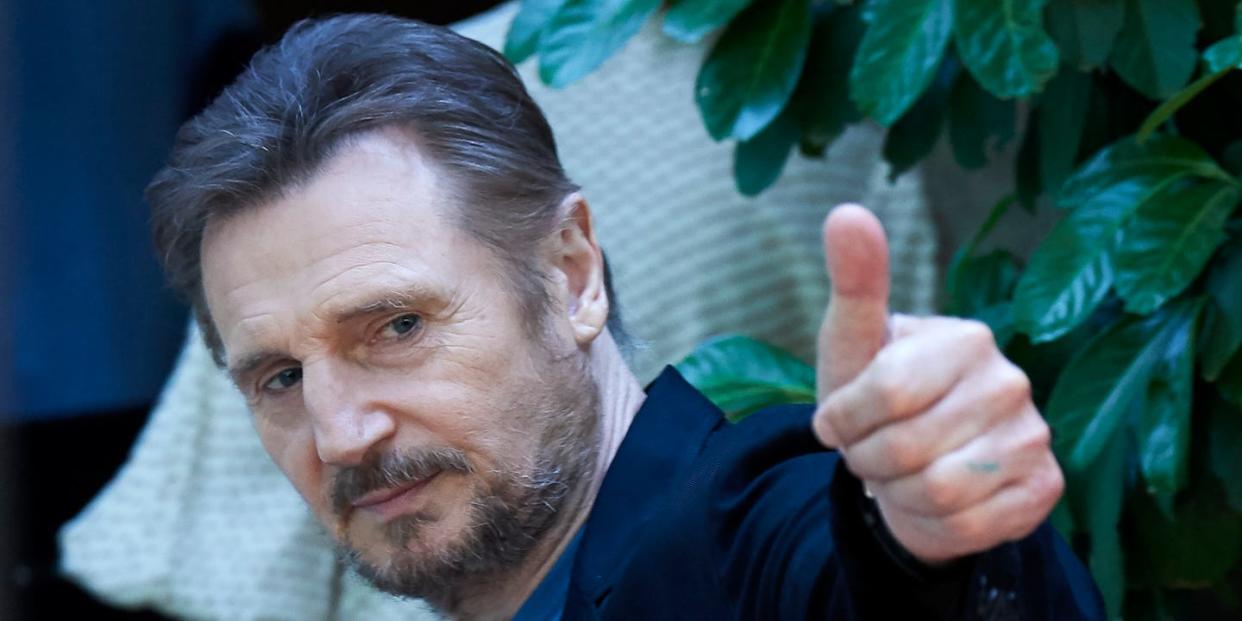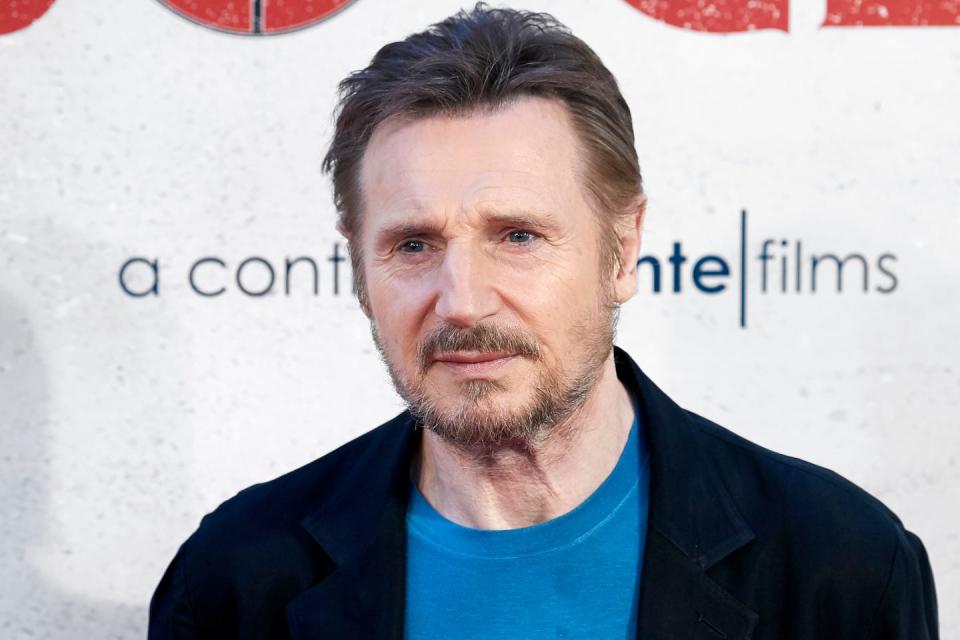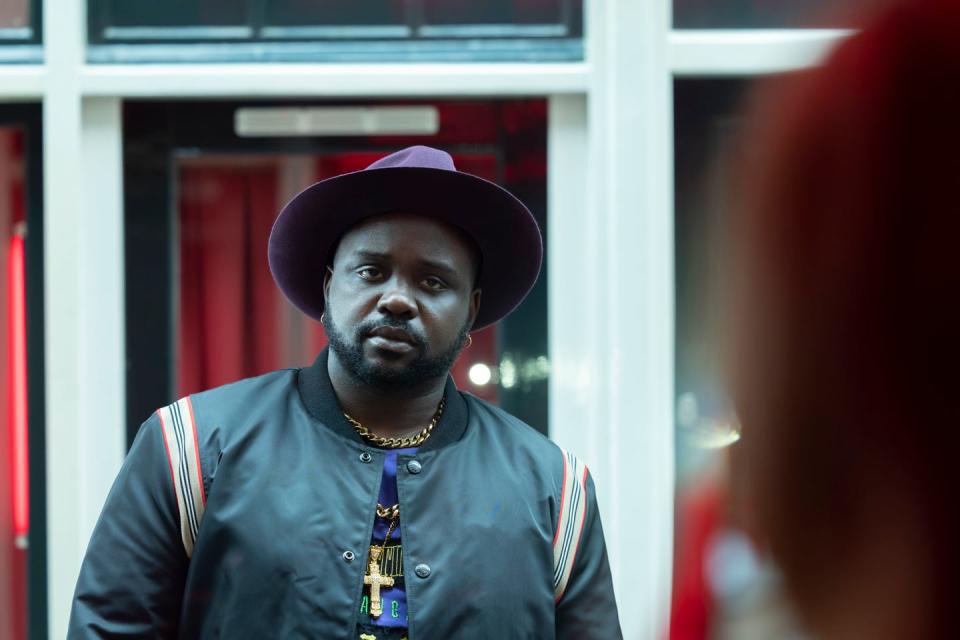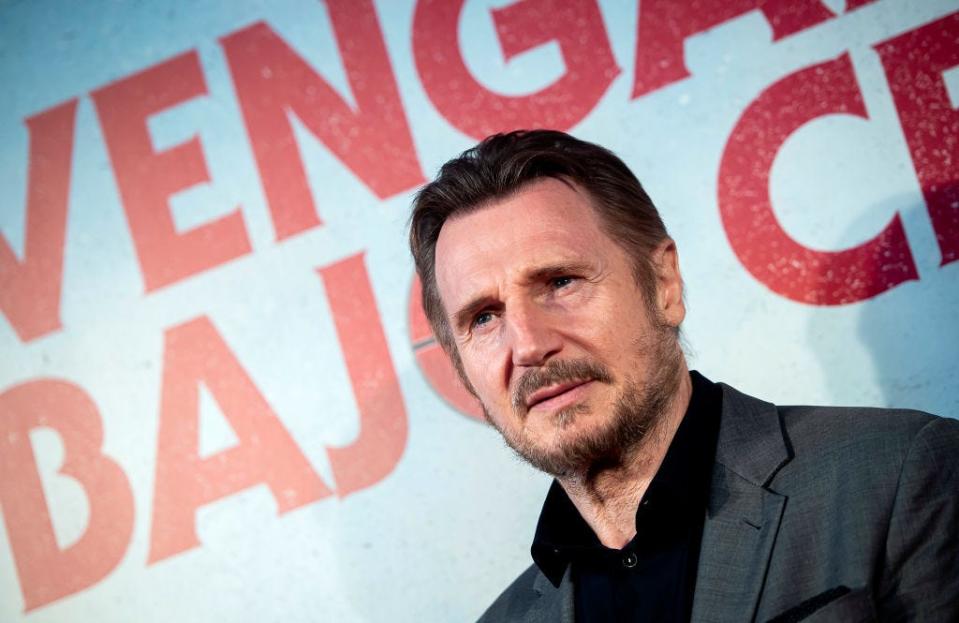Liam Neeson Addressed His Real Racist Controversy on 'Atlanta' In The Strangest Way

This week's episode of Atlanta takes its typical pop culture commentary to a new level of subversion. In the episode titled "New Jazz," an old controversy is rehashed peculiarly when Paperboi stumbles into a regal yet seedy Amsterdam nightclub where someone drinks while dressed as a dalmatian elicits no surprise from anyone around. Then, after being weirded out by a few brazen comments by the people he's with, Paperboi stumbles into a separate room where he runs into someone you'd never expect would appear in Atlanta: Liam Neeson.
Neeson's conversation with Paperboi goes from cordial to suspicious quickly. After Paperboi tells him he got into the club thanks to a local, Neeson snarkily asks if the local strangled a fan or had sex with a teenager. Then, just as you're about to ask what the hell is wrong with Liam Neeson, Paperboi glances at a napkin with the name of the club emblazoned in gold lettering: Cancel Club.
Brilliantly, Atlanta presented a physical location where all the people canceled by society could have a jolly good time without being judged for their reprehensible behavior. In the Cancel Club, someone called a woman's room 106 & Park because she is known to have sex with rappers and was greeted with laughter instead of derision. But why is Liam Nesson frequenting this physical manifestation of one of the levels of hell from Dante's Inferno? It doesn't take too long to find out Neeson is there for a controversy he sparked three years ago involving rape, revenge, and racism.

What was the Liam Neeson racism controversy?
In a 2019 interview with The Independent to promote his film Cold Pursuit, an action-thriller film where Neeson's character seeks revenge for his son's murder. Neeson has owned the parental revenge hero movie genre since he warned a kidnapper of his "particular set of skills" in Taken in 2008. So it would be safe to assume someone who's done interviews for revenge films for over a decade could reflexively spout off media-trained answers. But, for some reason, he really wanted to drive the point home about the primal urge for revenge by offering up a story of how he sought out lethal retribution over the rape of a friend of his.
After the unidentified woman told him she didn't know who the person was, Neeson's detective skills led him to ask her, "What colour were they?" Once she informed him the rapist was Black, Neeson admittedly went into a race-fueled rage. If what Neeson said he did after finding out this piece of information was in any of his revenge films, no one would believe it. "I went up and down areas with a cosh, hoping I’d be approached by somebody – I’m ashamed to say that – and I did it for maybe a week, hoping some ‘black bastard’ would come out of a pub and have a go at me about something, you know? So that I could...kill him," Neeson said in the interview.
As you'd expect, Neeson's racially insensitive comments stirred up passionate responses from people vilifying him. Some people pointed to how Neeson exhibited toxic white privilege. The New York premiere for Cold Pursuit, scheduled to occur a week after Neeson's comments were made public, was rumored to have been canceled at the last minute due to the controversy. He tried clarifying on Good Morning America the day after the Independent interview that he wasn't racist and the incident happened 40 years ago. He said he only mentioned it because The Independent journalist Clémence Michallon asked how he taps into the feeling of revenge to play his role in Cold Pursuit. He also took a surprisingly defensive veiled shot at his detractors while explaining how he intended to reveal the story to touch on a human experience we all go through. "We all pretend we're all politically correct in this country... in mine, too. You sometimes scratch the surface, and you discover this racism and bigotry, and it's there," Neeson said on Good Morning America.

Did Liam Neeson apologize on Atlanta?
Not really. In the show, Neeson delivers the classic half-committed apology where he's only apologizing "if I hurt people." As he did in the Good Morning America interview, he does express regretful shock at having those racially-charged feelings of revenge. His usual low, gravelly voice also comes off as earnestly reflective when he explains to Paper Boi he revealed the story to the world and "thought people knowing who I once was made clear who I am; who I've become."
For a second, Neeson lulls you into a false sense of empathy for a man willing to own up to his past misdeeds with a believable level of temerity in his admissions. But then, reality takes a backseat to Atlanta's brand of surrealism when Neeson corrects Paper Boi after the rapper says he's glad Neeson doesn't hate Black people. "I can't stand the lot of you. Now, I feel that way because you tried to ruin my career— didn't succeed, mind you. I'm sure one day I'll get over it, but until then, we are mortal enemies."
To Neeson in the show, the only thing he learned from the entire three-year ordeal is "the best and worst part about being white is we don't have to learn about anything if we don't want to." At the end of the episode, it's revealed Paper Boi had been asleep for 10 hours and likely dreamed of the entire Cancel Club experience.

Was Neeson seeking absolution through parody? Was he hiding his true feelings in plain sight on a show where caricatures run rampant? Or did he simply just want to be part of the Donald Glover universe any way he could? Whatever is the reason, Neeson just delivered Atlanta one of its most shocking scenes of Season 3 that'll have everyone talking about him again, for better or (likely) worse.
You Might Also Like

